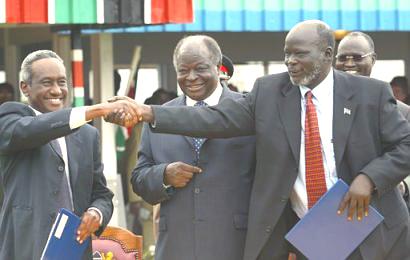Sudanese government, rebels officially end 21-year civil war

NAIROBI, June 05, 2004 (AP) — Sudanese government and rebel negotiators began the final phase of their peace talks Saturday, preparing a timeline to implement a series of agreements reached in earlier rounds of discussions to end a 21-year civil war.
Both sides and Kenyan mediators have said that all of the difficult, political issues have been solved and all that is left is working out how to implement them.
“Now all we have is flat land, the hills and the mountains have been surmounted,” said Kenyan Gen. Lazarus Sumbweiyo, the chief mediator.
Kenyan President Mwai Kibaki hosted a lavish ceremony Saturday at the presidential mansion for Sudanese Vice President Ali Osman Mohammed Taha and John Garang, leader of the rebel Sudan People’s Liberation Army. Representatives from the Arab League and the African Union also attended.
Sudanese government and rebel representatives signed a document Saturday compiling six previously negotiated protocols into one framework agreement, a step that Norwegian International Cooperation Minister Hilde Johnson said would allow donors to move forward with their plans to support the implementation of the peace agreement.
Among the procedures left to finalize are a final, internationally monitored cease-fire agreement and a timeline for implementing the agreement. Talks to put together the comprehensive peace agreement will begin on June 22, Sumbweiyo said.
The signing of the last, and most important, protocol took place May 26 in Naivasha, 100 kilometers west of the Kenyan capital.
The peace accord being finalized in Kenya is unrelated to fighting in the Darfur region of western Sudan , where fighting between the government and rebels have raised fears of ethnic cleansing.
Despite optimism that a comprehensive agreement to end the war in southern Sudan will be reached soon, it could take months to determine if the diplomatic solution will translate to peace on the ground. Rogue government and rebel militias prowl rural areas with little accountability to any higher authorities.
The latest effort to end the southern conflict began in Kenya in 2002 and the two sides have agreed on how to share power and wealth in Africa’s largest country and what to do with their armed forces during a six-year transition period.
Sudanese President Omar el-Bashir will remain head of state during the interim period, while rebel leader John Garang will become first vice president, negotiators have said.
The southern conflict broke out in 1983 after the rebels from the mainly animist and Christian south took up arms against the predominantly Arab and Muslim north.
The insurgents say they are fighting for better treatment and for southerners to have the right to choose whether to remain part of Sudan . Southerners will vote in a referendum at the end of the transition on whether to secede.
Although often simplified as a religious war, the conflict is fueled by historical disputes and competition for resources, including major oil reserves.
